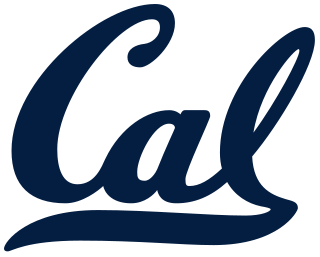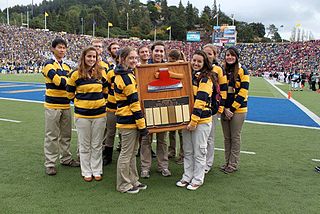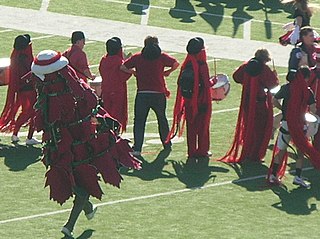
Big Game is the name given to the California–Stanford football rivalry. It is an American college football rivalry game played by the California Golden Bears football team of the University of California, Berkeley and the Stanford Cardinal football team of Stanford University. Both institutions are located in the San Francisco Bay Area. First played in 1892, it remains one of the oldest college rivalries in the United States. The game is usually played in late November or early December and its location alternates between the two universities every year. In even-numbered years, the game is played in Berkeley while odd-numbered years are played at Stanford.

The Stanford Axe is a trophy awarded to the winner of the annual Big Game, a college football match-up between the University of California, Berkeley Golden Bears and the Stanford Cardinal. The trophy consists of an axe-head mounted on a large wooden plaque, along with the scores of past Big Games. Cal currently holds the Axe after defeating Stanford 27–15 in the 2023 game.
The Oski Yell is the University of California Berkeley spirit yell from which the school’s mascot, Oski the Bear, derives his name. Although Oski appeared in 1941, the yell was first performed around the turn of the 20th century. The yell's origins are uncertain, although the University of Illinois originated a similar yell in 1899. Another early version is credited to Vince Wirtz, who led a similar cheer beginning in the 1920s at football games for Hamilton, Ontario teams.

Oski the Bear (Oski) is the official mascot of the University of California, Berkeley ("Cal"), representing the California Golden Bears. Named after the Oski Yell, he made his debut at a freshman rally in the Greek Theatre on September 25, 1941. Prior to his debut, live bears were used as Cal mascots. Oski's name, design, and character were developed by William “Rocky” Rockwell, who was the first student to play the role, and Warrington Colescott, an editor of The Daily Californian and famed satirist.

The Stanford Tree is the Stanford Band's mascot and the unofficial mascot of Stanford University. Stanford's team name is "Cardinal", referring to the vivid Stanford Cardinal Red color, and the university does not have an official mascot. The Tree, in various versions, has been called one of America's most bizarre and controversial college mascots. The tree regularly appears at the top of Internet "worst mascot" lists but has also appeared on at least one list of top mascots.

"The Bonnie Blue Flag", also known as "We Are a Band of Brothers", is an 1861 marching song associated with the Confederate States of America. The words were written by the entertainer Harry McCarthy, with the melody taken from the song "The Irish Jaunting Car". The song's title refers to the unofficial first flag of the Confederacy, the Bonnie Blue Flag. The left flag on the sheet-music is the Bonnie Blue Flag.
The University of Alabama is a school with many traditions. This article describes several of these traditions.

The Montana Grizzlies and Lady Griz are the nicknames given to the athletic teams of the University of Montana, located in Missoula. The university is a member of the Big Sky Conference and competes in NCAA Division I, fielding six men's teams and nine women's teams. The football team has won the university's only two NCAA championships.

The California Golden Bears football program represents the University of California, Berkeley in college football as a member of the Atlantic Coast Conference at the NCAA Division I FBS level. They were previously a member of the Pac-12 Conference. The team plays its home games at California Memorial Stadium and is coached by Justin Wilcox. Since beginning of play in 1886, the team has won five NCAA recognized national titles - 1920, 1921, 1922, 1923, 1937 and 14 conference championships, the last one in 2006. It has also produced what are considered to be two of the oddest and most memorable plays in college football: Roy "Wrong Way" Riegels' fumble recovery at the 1929 Rose Bowl and The Play kickoff return in the 1982 Big Game.
"Big C" is a fight song of the University of California, Berkeley. It was composed in 1913 by Harold P. Williams, with lyrics by Norman Loyall McLaren. It was written to commemorate the construction of the large concrete "C" in 1905 on the "rugged Eastern foothills" of the Berkeley campus. The song was the winning entry in the Daily Californian school song competition in 1913. Arrangements of the tune are used by other schools in the University of California system.

The Phoenix Five were a group of five University of California, Berkeley (Cal) students in Theta Chi who stole the Stanford Tree from the Band Shak on the campus of Stanford University in the early morning hours of October 17, 1998. The Phoenix Five held the 10-foot-tall (3.0 m) costume and university's unofficial mascot "hostage" for two weeks, and the reaction to the heist by school administrators fueled a frenzy of media coverage which resulted in the prank being regarded as one of the most famous and notable in the history of the Big Game rivalry between Cal and Stanford. The Phoenix Five used pseudonyms to hide their true identities, going by Mr. Black, Mr. Green, Mr. Orange, Mr. White, and Mr. Yellow.
"Sons of California" is a fight song of the University of California, Berkeley, as well as the University of California, Davis. It was composed by Clinton "Brick" Morse in 1896. Although it was originally an unpopular song among students because of its slow and solemn hymn, the Cal Band began performing a more lively version in the 1930s. From then on, "Sons of California" would remain one of the best known songs at the University.
The California Indian Song was a school fight song of the University of California, Berkeley, written by Harold Bingham in 1907 celebrating the rivalry between the California Golden Bears and the Stanford Cardinal. At that time, the mascot of Stanford University was the Stanford Indian, but the mascot was abandoned in 1972 because it was considered offensive. The California Indian Song was also abandoned, but has recently found a new fan base among Golden Bears fans.

"Hail to Pitt" is the most traditional fight song of the University of Pittsburgh, which is commonly referred to as Pitt. The saying "Hail to Pitt!" is also the most traditional and commonly used slogan of the University of Pittsburgh and its athletics teams. The slogan is frequently used in promotional material, printed on merchandise and souvenirs. It was also the title of a 1982 history of Pitt athletics by author Jim O'Brien. The slogan is often used among alumni as a statement of affiliation, including as a closing signature in conversation or correspondence between alumni, and is sometime abbreviated as "HTP" or "H2P", the latter of which is a registered trademark of the university and is frequently used on official university signage and merchandise.

"The Red Flag" is a socialist song, emphasising the sacrifices and solidarity of the international labour movement. It is the anthem of the British Labour Party, the Northern Irish Social Democratic and Labour Party and the Irish Labour Party. It was formerly used by the New Zealand Labour Party until the late 1940s. The song is traditionally sung at the close of each party's national conference.
"Up With Montana" is the fight song of the University of Montana. Its lyrics are credited to Dick Howell, a law student and member of the glee club in the 1910s, who wrote them in 1914 “to commemorate the rivalry” for the 21st meeting between the University of Montana and its rival Montana State University, then known as State University of Montana and Montana College of Agriculture and Mechanic Arts respectively. Referencing the song's final stanza, "And the squeal of the pig will float on the air; from the tummy of the Grizzly Bear", The New York Times commented that "at the University of Montana, fans expect their team to devour its enemies while still alive." Despite the reference, eight months earlier in January 2002, the song was read aloud on the Senate floor by Sen. Fritz Hollings as part of a friendly bet with Montana's Senator Max Baucus over who would win the NCAA I-AA Football Championship that year.
"Up with the White and Gold" is a fight song at the Georgia Institute of Technology. It is generally played after a touchdown in a Georgia Tech Yellow Jackets football game. The song's title refers to Georgia Tech's school colors and its lyrics contain the phrase, "Down with the Red and Black", an explicit reference to the school colors of the University of Georgia and the then-budding Georgia–Georgia Tech rivalry.
Oh well it's up with the White and Gold,
Down with the Red and Black,
Georgia Tech is out for a victory.
We'll drop the battle-axe on georgia's head,
When we meet her our team is sure to beat her.
Down on the old farm there will be no sound
Till our bow-wows rip through the air;
When the battle is over Georgia's team will be found
With the Yellow Jackets swarming around!

White Memorial Fountain, also known as The Claw, is a fountain by Aristides Demetrios on the Stanford University campus in Stanford, California, United States. It was installed in 1964, and Demetrios returned to restore the fountain in 2011. It has 65 jets.









